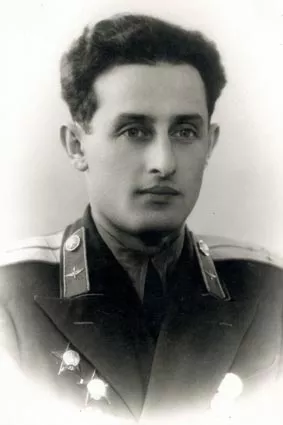This photograph shows me in 1944 in Moscow.
I got an occasion to be in Moscow on business trip.
At that time the war was far from its end. In winter and spring of 1945 our regiment took part in the liberation of Poland.
At that time we bombed Konigsberg for the 2nd time during the war. The task was more complicated for us, because German emplacements had been fortified with a great number of antiaircraft guns which fired at our planes. We suffered heavy losses, but in the beginning of April Konigsberg was taken.
It was clear that that period of war was all-important. Our regiment shifted its base: we moved to Poland. We were 600 kilometers far from Berlin: for us it was a stone's throw.
On April 10 we bombed enemy ships in the Baltic Sea ports. Our mission was not to permit German armies to land, because those armies were going to assist the Berlin garrison.
On April 17 we bombed the fortified zone on the left bank of Oder River. About 100 searchlights were turned on simultaneously and highlighted the zone. German disposition became clearly visible.
And on April 20 we fulfilled one of the fiercest bombing attacks at Berlin. At the end of April we again bombed German armies in the encircled Berlin. I participated in those last fighting starts. The last bomb was dropped on Berlin on April 28, 1945.
At last the long-awaited victory came. I'll never forget the scene of people cheering the news that victory had come. Our regiment was at the front line all the war long.
We destroyed 243 planes on enemy airdromes and 48 ones in air fights. In our regiment 29 persons were decorated with the Gold Star medal of the Hero of the Soviet Union; and one person received the award twice.
Here I'll tell you about my awards, do not consider me a boaster. For my service in battle I was awarded 2 Orders of the Red Star, medals For the Defense of Moscow, For the Defense of Leningrad, and For the Defense of Stalingrad.
During my army service since 1939 and till the victory day I did not come across any manifestations of anti-Semitism (there were even no hints at it). Not being afraid to seem stilted, I should say that we were members of the friendly multinational family.
By the way, it is necessary to note that the regiment secretary of the local Party organization was Anatoly Yukelson, and the political leader of the 2nd regiment of our division was Ilya Gherson. As you already know, I was the regiment Komsomol leader (Katsenelson!).
Therefore soldiers used to say as a joke that political work in our division was based on 3 "sons". So anti-Semitism was out of the question!
So the war was won, and the process of demobilization was started. I started thinking about my future life. One the one hand, I had an opportunity to return to the College where I was called up from. On the other hand, my friends told me that there was an opportunity to stay in the army, become an officer and enter a military academy.
The chief of our political department persuaded me to go for studies to the Military Political Academy. He also suggested me to remain at him, to become his assistant in Komsomol work. Of course that was the way to rise very rapidly, but it was a political way. In that case I would immediately become a major and get large salary. But I did not want to make such a career. You see, during my service I did my best to avoid advances in rank: I was afraid that it would delay my demobilization.
Since my childhood I was interested in technology. Therefore I turned down the proposal of the political department leader and persuaded my chiefs to let me off for studies at the Military Academy named after Zhukovsky at the radio engineering faculty.
[Air Force Academy named after Zhukovsky is the largest center of aviation science and preparation of engineering, scientific, and pedagogical staff.] As military academies admitted only officers, I was quickly advanced in rank and became lieutenant. But in spite of the fact that the regiment command gave me official permission, they were very dissatisfied with my forthcoming departure, therefore I was afraid that they could change their mind.
My documents had been already sent to the Academy, it was necessary to hasten. So on the day of departure I even did not go to say goodbye to the regiment political leader (by the way, my overcoat remained in his study and I never got it back!).
It is necessary to say that during the war I got an occasion to be in Moscow on business trip. There I went to the Academy to learn about entrance rules and to form my own opinion about the situation.
Wandering about, I saw through the huge glass door that a person in rank of senior lieutenant was washing the floor in the hall. I thought 'And what shall I (a first sergeant!) be obliged to do here?' And I left the Academy thinking that I would never be back.













